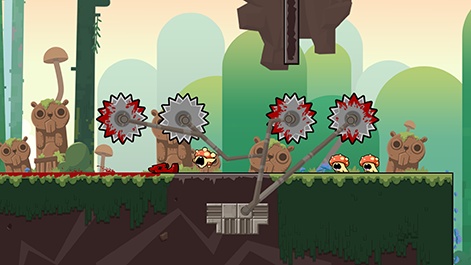Super Meat Boy was one of the instigators of the indie games boom.
Launching back in 2010, the project highlighted what was possible with the creativity of a two-man team, and was one of the most eye-catching titles of the year.
But now Team Meat is back with a sequel, Super Meat Boy Forever. In many ways, it’s much the same as the first release. The skinless protagonist and Bandage Girl return, though this time they have a child called Nugget, who is predictably stolen by antagonist Dr Fetus.
There’s a wealth of changes for this new outing. For one, there is no directional control, which seems... odd for a platforming game. Instead, the two inputs let players jump and slide.
“The biggest and most noticeable change is the controls,” designer Tommy Refenes says.
“For the sequel, we wanted to see if we could simplify the controls down to two buttons and still feel and play like Super Meat Boy. It was a tough job but we succeeded. The overwhelming majority of people who have played the game have said something along the lines of ‘It's different, but it feels just as good’.”
The other headline feature for Super Meat Boy Forever is what happens when you replay a level. Upon repeated playthroughs, stages change to become more difficult. It’s possible to foresee a time where a user has played through a level so much and it has changed to such a degree that gamers are unable to proceed. But the way this was designed means this won’t happen.
“There is no concern there because the level generation process is not purely algorithmic,” Refenes explains.
“Every level in Super Meat Boy Forever is made up of 40 to 50 individually designed mini levels per level that are ranked by difficulty and pieced together randomly based on a cadence we create to properly ramp the difficulty when presented to the player. The mini-levels are randomly selected and pieced together into a large level that feels as if we specially designed a level for the player.
“We aren't randomly placing saws or calculating jumps; we're sort of presenting you with Meat Boy flash cards because in order for the game not to feel like an unfair clusterfuck of a challenge we need to maintain a level of control over the difficulty and levels need to have good and thoughtful design.”

When Super Meat Boy launched originally, it was at the start of the current indie boom. This time around, said indie market is booming to the point of saturation.
“[The market is] crowded,” Refenes says.
“I don't know if that's good or bad. I still maintain that games succeed or fail based on how well made and appealing they are. There are a ton of games coming out all the time but I still feel a game that can create excitement within people while staying inside a reasonable development budget will get noticed and will have a level of success.”
But in itself, Refenes explains that making Super Meat Boy Forever wasn’t so different from developing the original Super Meat Boy.
“It's the same. We were lucky enough to put out Super Meat Boy at a time when the market was less crowded and since Super Meat Boy was an exceptional game its time in the spotlight was longer and focused,” he says.
“That allowed a very large fan base to grow quickly. So moving forward with Super Meat Boy Forever we just have to focus on making something amazing that our fans will love and that should be enough to be a success. To get more players who have maybe never heard of Super Meat Boy... well that's what advertising, streamers and YouTubers are for.”
Refenes' goals for Super Meat Boy Forever are, admittedly, pretty simple.
“I hope it does well enough to make a game after it without having to take out a bank loan, remortgage a house, or get a publisher.”

















